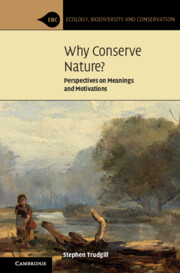Book contents
- Why Conserve Nature?
- Ecology, Biodiversity and Conservation
- Why Conserve Nature?
- Copyright page
- Dedication
- Contents
- Foreword
- Preface
- Part I The Experience of Nature
- 1 The Experience of Nature
- 2 Climate Change
- Part II Nature Imagined
- Part III Nature, Self and Place
- Part IV Why Conserve Nature?
- Bibliography
- Index
1 - The Experience of Nature
from Part I - The Experience of Nature
Published online by Cambridge University Press: 03 February 2022
- Why Conserve Nature?
- Ecology, Biodiversity and Conservation
- Why Conserve Nature?
- Copyright page
- Dedication
- Contents
- Foreword
- Preface
- Part I The Experience of Nature
- 1 The Experience of Nature
- 2 Climate Change
- Part II Nature Imagined
- Part III Nature, Self and Place
- Part IV Why Conserve Nature?
- Bibliography
- Index
Summary
Why do we1 want to keep anything? Surely it is because it means something to us? Isn’t it because we value qualities like usefulness and the ways in which we can cherish memories and meaningful associations? We may keep things which make life easier, help us in day-to-day living and might assist us in some future difficult time. We may also value those things with enriching associations – something we found on a memorable day; something which appealed to us for its form and beauty, its intricacy, diversity or simplicity; something inherited from an ancestor or given to us by a friend or parent. Or it can be something we did not know about but which we found out about in the media or which a teacher, parent or mentor told us was rare, valuable, a privilege to have. Thus, the meaning can be discovered by yourself or a meaning can be given to you by someone else which then becomes significant to you. Whatever the many reasons for keeping something, it is the value and the meanings which make us cherish it: the meanings vary widely, but meanings there have to be. Hence the subtitle of the book: Perspectives on Meanings and Motivations. Meanings are the key.
- Type
- Chapter
- Information
- Why Conserve Nature?Perspectives on Meanings and Motivations, pp. 3 - 62Publisher: Cambridge University PressPrint publication year: 2022



